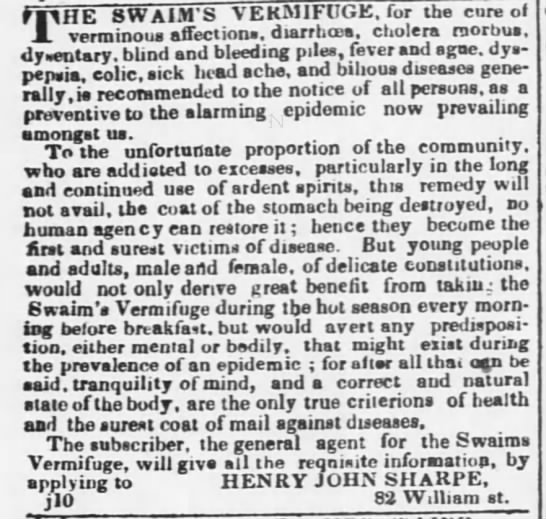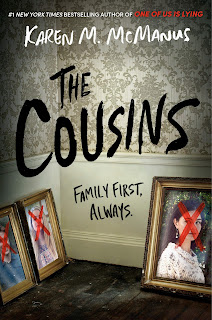This is the first of twelve posts!
A Visiting Quack: Selections from Eliza Leslie
Upon first reflection, the book appears to be one of those "womanly things," a primary source easily overlooked by people studying battles or famous nonsense. It has recipes, stories, and project ideas; it is easily compared with magazines from today. And if I weren't the crazy studier/researcher that I am, I'd perhaps leave it at that. But oh! The meanings of things if we just take a closer look.
While not the most discussed topic in the book, I'd like to discuss one moment from a story that concerns medicine. For the 19th century person, taking care of oneself was necessary. There was no doctor or emergency room to rush to; advances in medicine were ongoing, but didn't necessarily reach every household. Reading materials often mentioned a person's spirituality as a component of health:
"Sickness came by sin. Man is a fallen creature in both body and soul." (1)
Eliza Leslie does mention physical ailments and health, albeit indirectly in her stories. I'd like to argue that this knowledge was rudimentary, but certainly practical. While people did not know the inner working of all illnesses, they certainly understood enough to practice basic medical care at home. Or at least enough to know when someone was pretending to be a doctor.
The Traveling Tin Man illustrates the mistrust of such charlatans, even from the common person.
The Traveling Tin Man illustrates the mistrust of such charlatans, even from the common person.

1846
The Warners, a Quaker family from Pennsylvania, are visited by a traveling merchant on their farm after a hard day of work. The tin man presents a variety of health related wares alongside the usual array of coffee pots and water dippers. The family was skeptical of these shiny medicines, and not just because the merchant made them himself:
"There were certain cures for every complaint in natur; draps for agur, the toothache, and the rheumatiz; salves for the ring-worms, corns, frost-bitten heels, and sore eyes, and pills for consumption and fall fevers; beside that most waluable of all physic, Swaim's Wormifuge"
Very quickly the "young people exclaimed with one accord against the purchase of any of the medicines." With that, the tin man put them away and readily accepted the invitation for dinner. Of course the story continues with his (terrible) shenanigans. If you haven't guessed already, he's not the hero...
Let's begin with the spelling of that atrocious description of the medicine. The English teacher in me shuddered to type that out (and I don't usually carry a red pen around). Of course they would be spelled so horribly, as they noted that the labels were "inscribed with his [the tin man's] own name in his own handwriting." If that doesn't tell you that the guy is a fraud, what will?
I was also interested in "Swaim's Wormifuge," which sounded like all sorts of wrong spelling. Turns out, this actually existed as Swaim's Vermifuge (medicine that destroys worms???). William Swaim began production of his medicine in the 1820s, and from there published a book that recommended the use of his treatments. It has been suggested that he swiped the recipe from Dr. N.J. Quackinboss (really???), since apparently Swaim was a bookbinder by trade. No medical license hanging up on his wall.
The mixture included mercury, oil of wintergreen, and sarsaparilla. Poor Nancy Linton never stood a chance. But nice scarf, I guess?
Despite the fact that this was literally MURDER WATER, Swaim was worried others would try to replicate his special formula:
"But this medicine has yet another class of enemies who it is to be feared may or have effected more practical injury to the public than the other as their bold pretensions may deceive the ignorant. It consists of those apothecaries and others who admitting Mr Swaim's title to the original discovery advertised that they have attained the knowledge of his secret." (2)
Swaim made a ton of money from the mixture, despite many doctors recommending against it. His son continued the business and it was sold into the 1920s. You can go on ebay today and find people selling the bottles. I have to admit, they are pretty bottles, even if they sold death juice.

You are very clever, Eliza Leslie!
The tin man was our villain from the beginning, despite his promises of scallop-edged pie tins.
The moral of this story, I've gathered, is that a quack deserves what punishment he receives. Certainly the crime of kidnapping a child and attempting to sell her into slavery earned the shady tin man his fines and imprisonment. However, the moment I discovered he was selling his own special brand of homemade medicine, I know the guy was terrible. Quacks still exist today, with their stupid diet pills and even more ridiculous juice cleanses that claim to heal organs. NOPE.
Overall, taking a closer look at a tiny portion of this Eliza Leslie's writing yielded a ton of research about the 19th century, and helped me to better understand the time period. Perhaps my next working impression will be that of a quack, peddling my "medicine" to the unsuspecting buyer.
Or I'll just buy some pie tins.
~Kristen
(2) A Treatise On The Alternative And Curative Virtues Of Swaim's Panacea, And For Its Application To The Different Diseases Of The Human System: ... Its Pharmaceutic Effects As A Remedial Agent
(3) Swaim's Panacea
(4) Selections from Eliza Leslie



Wait. Am I super late to the table and the term "quack" comes from Dr. Quackinboss and I never knew this???
ReplyDeleteAlso, this was fascinating!